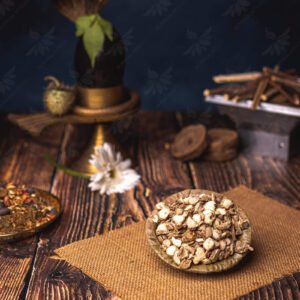Guggal, also known as Guggul or Commiphora mukul, is a resinous substance derived from the Commiphora tree, which is native to India. It holds a significant place in Hindu traditions, Ayurvedic medicine, and spiritual practices.
Guggal has been used for centuries in various rituals and ceremonies due to its sacred and purifying properties. It is often burned as incense, releasing a fragrant smoke that is believed to cleanse the environment, ward off negative energies, and create a serene and spiritually uplifting atmosphere.
In Ayurvedic medicine, Guggal is highly valued for its medicinal properties. It is believed to have anti-inflammatory, antiseptic, and rejuvenating qualities. Guggal is commonly used to support joint health, promote digestion, purify the blood, and balance the doshas (energetic principles) in the body.
The significance of Guggal in Hindu culture can be traced back to ancient times. It is mentioned in the Vedas, the ancient Hindu scriptures, and is associated with Lord Shiva. Guggal is believed to have been used by sages and yogis for its ability to enhance meditation, concentration, and spiritual practices.
Guggal is also known for its earthy, woody, and slightly balsamic aroma, which is considered to be deeply calming and conducive to introspection. Its fragrance is believed to stimulate the senses, awaken the mind, and facilitate a deeper connection with the divine.







Reviews
There are no reviews yet.